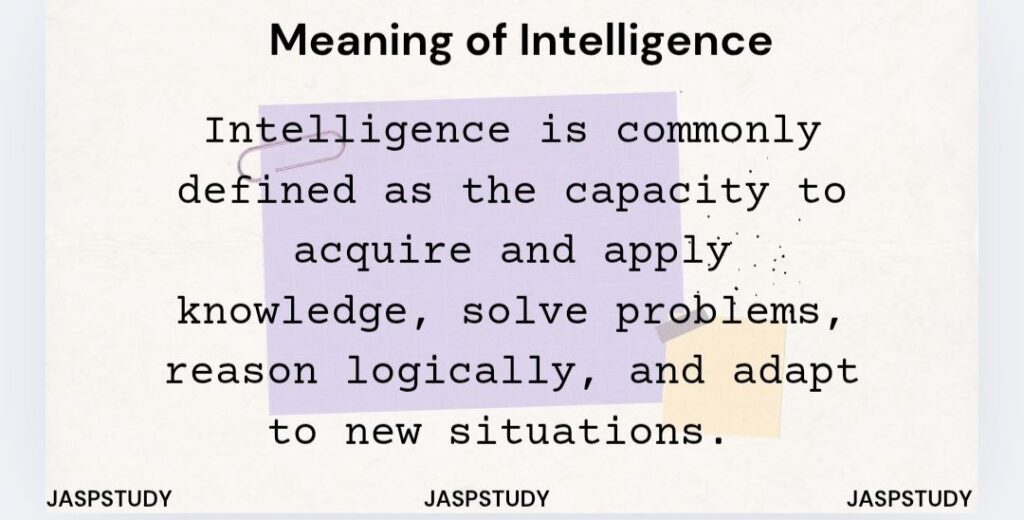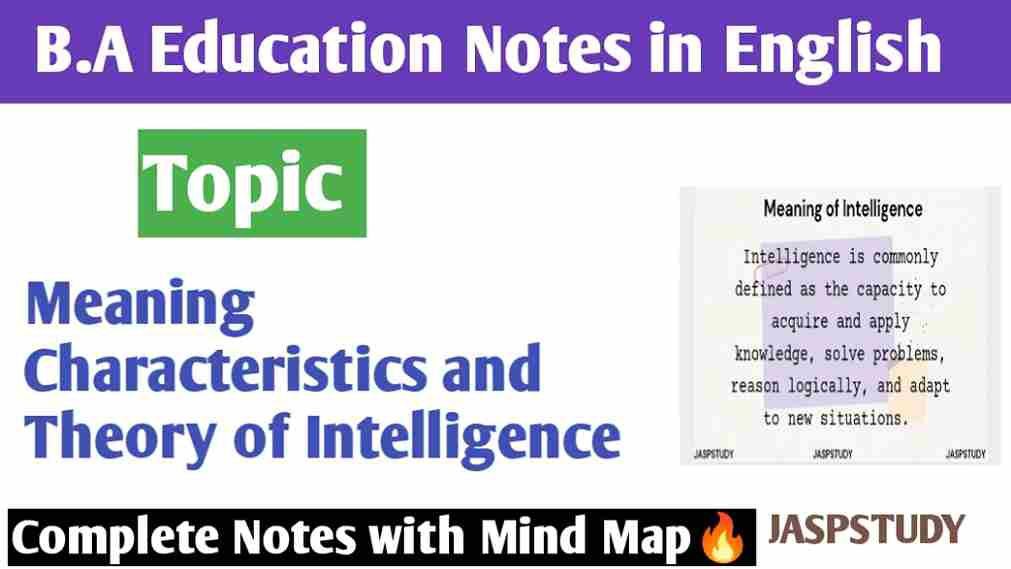In this Article we will discuss about Meaning,Characteristics and Theories of Intelligence.
Meaning of Intelligence

Intelligence is commonly defined as the capacity to acquire and apply knowledge, solve problems, reason logically, and adapt to new situations. It involves a combination of cognitive abilities, including but not limited to verbal comprehension, spatial reasoning, memory, perceptual speed, and reasoning skills. Historically, intelligence was initially conceptualized through psychometric approaches, particularly with the development of intelligence tests by pioneers such as Alfred Binet and Lewis Terman. These tests aimed to measure a general intelligence factor, often referred to as g, which was believed to underlie performance across various cognitive tasks.
Definition of Intelligence
The concept of intelligence has been defined in various ways by different pioneers in psychology and related fields. These definitions highlight the multifaceted nature of intelligence and its role in human cognition and behavior. Here are some influential definitions:
1. Alfred Binet (1905): Intelligence is the ability to judge well, to understand well, and to reason well.
2. Charles Spearman (1904): “Intelligence is a general cognitive ability that can be measured and quantified. It is composed of a general factor (g) that influences performance on all intellectual tasks.”
3.David Wechsler (1944): “Intelligence is the aggregate or global capacity of the individual to act purposefully, to think rationally, and to deal effectively with the environment.”
4. Jean Piaget (1952): “Intelligence is the ability to adapt to the environment through assimilation and accommodation. It involves the progressive development of cognitive structures that enable individuals to understand and interact with the world.”
5. Robert Sternberg (1985): “Intelligence is the mental capacity to automatize information processing and to emit contextually appropriate behavior in response to novelty. It includes analytical, creative, and practical abilities.”
- Philosophy- Meaning, Definition,Nature And Branches
- Unifactor Theory and Two Factor Theory of Intelligence
- Meaning,Characteristics and Theories of Intelligence
- Characteristics of Indian Educational Philosophy
- Characteristics of Western Educational Philosophy
- Meaning Scope And Functions of Philosophy of Education
- Interrelationship Between Philosophy and Education
- Philosophy- Meaning, Definition,Nature And Branches
Characterstics of Intelligence
1. Intelligence is an innate mental ability and can be developed through environmental conditions.
2. The levels of intelligence differ from individual to individual.
3. Intelligence is learning about and adjusting to environmental situations. new
4. It involves the ability of problem solving.
5. An intelligent person can tackle an abstract problem.
6. Intelligence reaches to peak during the adolescence period of growth and development.
7. Social intelligence, abstract intelligence and concrete intelligence are different forms of intelligence.
8. Intelligence is what intelligence tests measure.
9. Intelligence is normally distributed in nature.
10. Intelligence is composed of numerous factors like memory, word fluency, visualization, induction, deduction, convergence, divergence, verbal reasoning, etc.
11. Intelligence is mostly determined by heredity but a suitable environment necessary to improve it.
Theories of Intelligence
Theories of intelligence give us knowledge about the structure of intelligence. It is through the structure of intelligence that we come to know which elements or basic factors constitute intelligence. The number, order and strength of these elements have been divided differently by different scholars. At present, the following theories are available on the basis of intelligence or components-
Note – For Reading Click on The Theory
2. Spearman’s two factor theory,
3. Thorndike’s Multi Factor theory,
4. Thurstone’s Group factor theory,
5. Gardners Thoery Of Intelligence
6. Guilfords Structure Of Intelligence / Guilfords Theory of Intelligence
- Origin and Geographical Extent of Harappan civilization
- Main features of Mathura Style of kushana Sculptural Art
- Features of the Harappan civilisation
- Sailent features of the town planning of Harappan civilization
- Write a detailed note on Kayatha Culture and its salient features
- Write an essay on Jorwe Culture
- Main Features of Mauryan Art
- Discuss The Philosophy of History of Arnold Toynbee
- Date of coronaion of Kanishka1|Date of Accession of Kanishka 1

